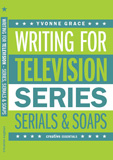Canadian J Lynn Stapleton is a writer, photographer and Geriatric Care Nurse who follows me on Twitter. She also loves to blog and interview when she can. Here is her recent interview with her friend, the American tv writer Jill Lorie Hurst.
‘Guiding Light’ was the world’s longest running soap opera until it was axed in 2009. Jill, like so many television writers, learnt her trade and honed her craft on the show. I have EastEnders to thank for my baptism of fire. So here, in solidarity, I post Lynn’s interview.
I particularly like what Jill says about the collaborative process of television series writing. Thanks Lynn for a great interview and insight into the working life of a talented writer and also for allowing me to share it here.
*********************************************************************************************************************************
In the several months previous to the American soap opera, Guiding Light, being cancelled and subsequently going off the air, I made friends with numerous other fans of the show, resulting in meeting in a large fan gathering in New York City to celebrate the final official fan club luncheon with the cast. It would also be the start of a wonderful friendship with one of the head writers of the series very soon after.
Holding various positions within the Guiding Light family from Assistant to the Writers, Scriptwriter, Assistant Head Writer, Story Producer and Co-Head-Writer, Jill Lorie Hurst has won a Daytime Emmy Award for Best Writing (2007), and a Writer’s Guild of America Award for Best Writing (2004), along with several nominations in both awards ceremonies over the years.
Over the past few years, we’ve talked on-line and in person about just about anything that strikes our interest, from soaps, to photography, to life in general. For a long time, I’d felt a bit odd asking a friend for an official interview, primarily about scriptwriting, but decided just to go with it and I’m glad I did.
Lynn: What got you interested in working in television as a writer when you were starting out?
Jill: I never thought about television writing until I started working at the front desk at the studio where Guiding Light was taped. You get to know about people when you wait tables or work at a front desk. The quality of people and storytelling at GL made me want to stay forever! I’d grown up writing, loved theater and I watched the [Proctor & Gamble] P&G soaps, but had no career plan. I left college in 1982 and moved from Detroit to New York City. I waitressed for 10 years and my life was pretty full. Full of theater going, travel and friends. And it was the 80’s – NYC was crackly and crime filled. A number of good friends were dying of AIDS. There was a lot going on, but I loved the restaurant, my co-workers, the customers. Luckily, one of my customers, Grace Bavaro, loved me enough to send me across town for a tour of the GL studio. A year later I started working part time at the front desk. I was in my early 30’s then. I didn’t officially join the show til I was almost 35, and I was close to 40 when I became a staff writer! A late bloomer by TV standards. I never thought of myself as a WRITER. I just wanted to be there and be part of the storytelling process and help put out the “product” on a day to day basis. If the environment at GL hadn’t been so amazing, I might’ve gone back to the restaurant business. I like working with good people, doing work I care about. Thanks to the generosity of some terrific people I got the chance to do that at Guiding Light for many years.
Lynn: When you look for inspiration for stories or dialogue, what are things that grab your interest/attention?
Jill: I’m not a big picture story teller – I tend to think in scenes and characters. I am inspired by people I see on the street, conversations I listen to on the bus, looking in windows as people live their lives. My husband, friends and family inspire me. Sometimes a really basic challenge or thought grabs you – like when Ellen Wheeler challenged all of us to come up with stories that would use P&G products. My choice of product turned into an idea that I still want to produce. A place – like the 24 hour laundromat in my NYC neighborhood – can get things going. I think writers need to look around and listen – that’s one of the reasons I don’t wear ear buds and listen to music on the street – or watch TV on my phone – I might miss a good character or setting!
Lynn: Creating storylines for groups of characters in a soap drama involves a lot of planning, organization and development before it even gets to the writing stage. What was your favourite aspect of storylining an idea for a group or for an individual? And conversely, the worst part?
Jill: I love being in a room with a group of writers when someone first mentions a new idea for a storyline or a couple – that moment when everyone stops for a split second to take it in – and then starts talking and tossing their thoughts into the pot. Story stew! I like story boards – using different color markers and squares of paper to lay out days/weeks/months of story. There’s something kind of intoxicating about moving the people and the scenes around, then finally coming up with the day, the week, etc that you’re happy with. I like having the end of the story up there first, so that we know what we’re writing toward. My other favorite job is script editing. It’s a great job. The best part was having the opportunity to assign a day to the right script writer, cheering them on through the week as they write and then, getting a beautiful script handed back to me. I can rewrite a not so good day if I have to – but I get no thrill out of the rewrite. I think I’m kind of good at knowing who’s good at what – who’s funny, who’s heartbreaking, who’s good at killing off characters (really) – and assigning accordingly! My least favorite part of the process is breakdown writing. Glad I had to do it. Don’t like it. Not very good at it.
Lynn: Have you ever had characters that get stuck in your head, demanding their stories to be told? Or had a particular scene becoming very vivid in your head and then have to write it down?
Jill: When you work on a show, the characters live with you and they tend to be a chatty group. If you listen to them, a lot of the story will unfold. Telling a story you love is so uplifting and fun. You can’t wait to get into the meeting, or sit at the computer (or grab your legal pad in my case) or get on the phone with the other writers. It just…bubbles. And when you’re telling a story you don’t believe in – it’s very upsetting. I used to carry on conversations with characters, other writers, the network in my head as I walked to work and I’m sure my facial expressions and mumbling scared a lot of people. Once someone actually stopped me to ask me if I was okay and I blurted. “No! We’re killing Ben today and we’re doing it for all the wrong reasons”. Yikes.
Lynn: What are some favourite pieces of writing advice given to you when you were starting out, that really stuck with you throughout your career?
Jill: Here are a few –
“When you’re writing the emotional/relationship stuff, keep it tight, contained. If the show is long and those scenes take up too much time they will be the first scenes cut and often that means losing the best stuff in the day. Protect those moments”. – From actress/director Lisa Brown
“There is no such thing as a stupid question. Ask the question.” – From producer Mary O’Leary
“Can we tell that story (write that scene) in 9 lines?” – From actress/executive producer Ellen Wheeler
“Don’t tiptoe into your scenes. Walk in, you have the right to be there.” – From writer/producer Claire Labine (when I asked for breakdown writing notes)
Lynn: Following Guiding Light’s cancellation, you had joined up writing for former GL actress, Crystal Chappell’s two-time Daytime Emmy Winner, ‘Venice the Series’ web soap for seasons three and four – and currently fifth season – of the series. What’s it been like switching from writing for a network soap opera to writing for a web platform soap opera?
Jill: Network vs. the web – It’s still serial storytelling, which is the great thing. I love the Venice characters. I’m more of a writer on this show and not part of the rest of the production team, which forces me to use different muscles. I’ve learned to collaborate on the phone, which has always been hard for me! I’m still wrestling with technology and realize how spoiled I was at GL, when I could scribble a scene on a legal pad and stand there looking crazy til Amanda took it away from me and said “That’s okay, Jilly. I’ve got it.” I’m glad our characters can swear and kiss and make love if the story calls for it! I love the freedom, but I miss some of the checks and balances that come with working for the network – they force you to try harder and find different ways to tell the stories you care about. Life is all about picking your battles. When I was on GL and we were answering to both P&G and CBS, we won some important battles, which was great – and we lost some fights that broke our hearts, both as writers and people. I learned a lot from all of those experiences.
Lynn: Are there any other series, either television or web, that you’d love to work on/ work with? Or have you any of your own projects that you’d love to start/continue with?
Jill: We just sent Venice 5 to Crystal and will start the edit as soon as we get her notes this week. I love working with Penelope [Koechl, co-writer] and we have a few ideas we’re discussing. I have to finish my book and there’s another project that needs to be attended to! I don’t think about writing Guiding Light any more – but the Guiding Light actors are so talented and inspiring that whenever I am working on anything, their beautiful faces and voices float through my head. I’d like to write them in very different roles. They are a great rep company. Mostly, I’m looking to tell stories that mean something and work with people I enjoy. That’s the plan. Hey, you made me come up with a plan! Thanks, my friend.
Well, I wish I had a lofty answer, but truth be told, we are sitcom junkies at our house. Modern Family saved our lives this year, along with Frasier, Roseanne and Cosby Show reruns – but sitcoms are serials too – family relationships, overcoming obstacles, love stories! I also love Orange is the New Black, The Good Wife and I think House of Cards is fascinating. Still like Grey’s Anatomy. Catching up on Parenthood, Last Tango in Halifax. I miss Friday Night Lights and Gilmore Girls. I like to think, but I like to laugh and cry and connect when I watch a show.
If you would like to see the interview on Lynn’s blog here it is and a couple of lovely pics to boot of Jill and Lynn in NYC Central Park. http://celtic-dragon.me/2014/08/03/conversation-with-a-storyteller/





 HAPPY NEW YEAR FROM SCRIPT ADVICE TOWERS….
HAPPY NEW YEAR FROM SCRIPT ADVICE TOWERS….